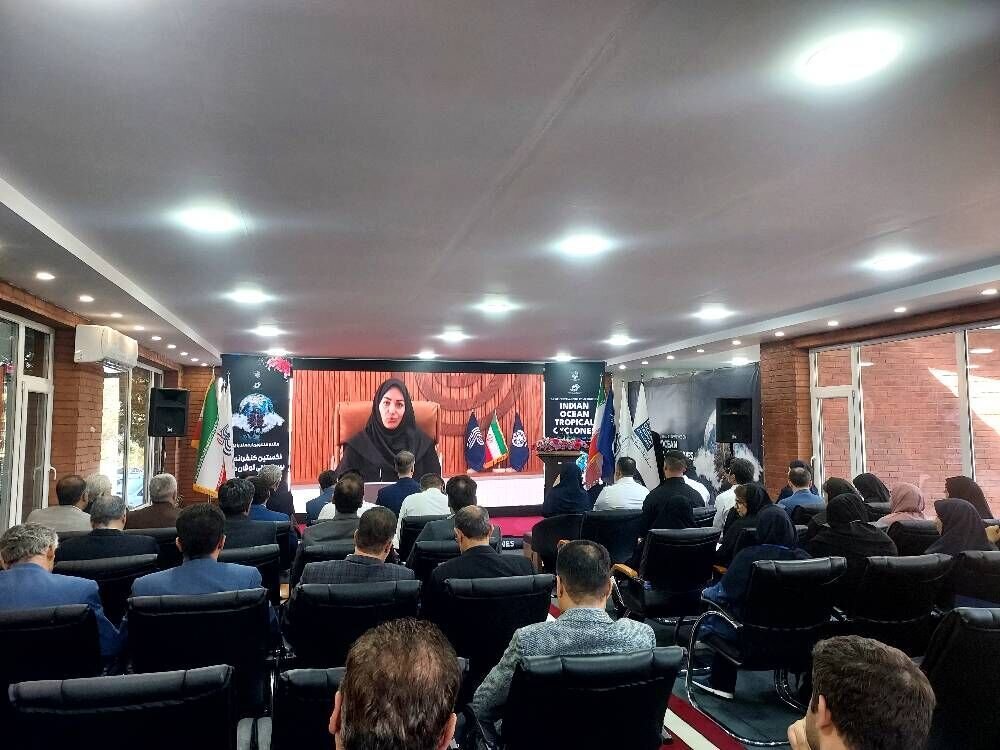Climate change makes tropical storms more frequent: IMO head

TEHRAN - Climate change has caused a gradual rise in the occurrence of tropical storms and their frequency is increasing more and more, Sahar Tajbakhsh, the head of the Iran Metrological Organization has said.
She made the remarks on the sidelines of the First International Conference on Indian Ocean Tropical Cyclones, which was held on October 9-10 at the Research Institute of Meteorology and Atmospheric Sciences (RIMAS).
She pointed out, “Tropical storms are one of the most important weather hazards that have been increasing in the world thanks to climate change. The Indian Ocean is no exception witnessing the increasing trend of these tropical cyclones.
Tropical storms mainly occur in the tropical parts of the oceans, and their importance is more due to the threat they pose to marine activities and coastal areas.”
She went on to say this is the first international conference on tropical storms in the Indian Ocean, which is organized by the Iranian Meteorological Organization and the Research Institute of Meteorology and Atmospheric Sciences in cooperation with the World Meteorological Organization (WMO).
In this regard, the WMO has considered several programs for monitoring and forecasting these storms including the creation of a panel for tropical storms in the Indian Ocean region, in which 13 countries are members.
She added, “This panel was launched in 1972 with the participation of 6 countries, and other members gradually joined it later.
Iran, Saudi Arabia, the United Arab Emirates, and Qatar are among the countries that have entered this panel since 2018.”
1st intl. conference on tropical cyclones
The Conference was held virtually with the theme of "Early Warning for Everyone".
“The main objectives are to synergize and exchange experiences in the field of monitoring and predicting tropical cyclones in the northern Indian Ocean region, and to commemorate the 50th anniversary of the establishment of the Tropical Cyclone Program known as (TCP),” IRIB quoted Mehdi Rahnama, the head of RIMAS, as saying.
Besides, the conference aimed to showcase the latest scientific achievements related to climate change and its consequences on the areas affected by tropical storms and to inform the members of the effects and consequences of sea storms.
Also, it would try to find the most appropriate solutions to deal with tropical storms’ economic, social, and environmental effects; their impact on maritime transport, and their coastal and marine uses.
Rahnama added, “Holding this conference will help to develop the necessary infrastructure for the monitoring network, database, and forecasting calculation models, as well as developing the necessary infrastructure for Early Warning Systems.”
Lecturers from China, Myanmar, the Philippines, India, Malaysia, and Oman announced their readiness to deliver speeches virtually, as well.
Panel on tropical cyclones
The WMO and the Economic and Social Commission for Asia and the Pacific (ESCAP) jointly established the Panel on Tropical Cyclones in 1972 as an intergovernmental body. Its membership comprises countries affected by tropical cyclones in the Bay of Bengal and the Arabian Sea.
The Panel is one of the five regional tropical cyclone bodies established as part of the WMO Tropical Cyclone Program (TCP) which aims at promoting and coordinating the planning and implementation of measures to mitigate tropical cyclone disasters on a worldwide basis.
The main objective of the WMO/ESCAP Panel on Tropical Cyclones is to promote measures to improve tropical cyclone warning systems in the Bay of Bengal and the Arabian Sea.
The basic purpose of the operational plan is to facilitate the most effective tropical cyclone warning system for the region with existing facilities.
The plan records the agreed arrangements for standardization of operational procedures, efficient exchange of various data related to tropical cyclone warnings, issue of cyclone advisories from a central location having the required facilities for this purpose, archival of data, and issue of a tropical weather outlook and tropical cyclone advisories as agreed by consensus at the WMO as part of the World Weather Watch for the benefit of the region.
For this purpose, there are Regional Specialized Meteorological Centre (RSMC)- Tropical Cyclone and Tropical Cyclone Warning Centers (TCWC) for different regions.
IORA workshop
In February, the third phase of the workshop series on the effects of climate on the Indian Ocean marine environment was held in Tehran.
The Indian Ocean Rim Association Regional Centre for Science and Technology Transfer (IORA RCSTT), the Iranian Research Organization for Science and Technology (IROST), the Iranian National Institute for Oceanography and Atmospheric Sciences (INIOAS), and the Regional Education and Research Centre on Oceanography for West Asia are holding the workshop.
The Indian Ocean Rim Association is an inter-governmental organization that was established on March 7, 1997.
The effects of climate change on the environment of the Indian Ocean and the introduction of measures taken to reduce the effects of climate change are discussed during the three-day event, IRNA reported.
The aim of the workshop is to enhance the knowledge of Member States and share information on the impacts of climate change on the marine environment.
The specific objectives are to promote sharing knowledge and findings on the effects of climate change on various aspects of the marine environment and ecosystem.
It also aims to enhance the capacities and skills of IORA Member States in sustainable management and conservation of marine biodiversity.
Encouraging international research partnerships to invest in the conservation and restoration of blue carbon ecosystems as an important component for mitigating the effects of climate change, and increasing awareness and resilience of IORA Member States on climate change-driven disasters and damages are some other goals of the workshop.
MT/MG
Leave a Comment